At least 100,000 people have fled Syria’s northwestern province of Idlib, one of the last regions controlled by rebel forces, since Bashar al-Assad’s regime began an assault on the stronghold and adjacent districts in Hama and Aleppo in November 2017.
The campaign has been led by the regime’s most effective Special Forces unit, known as Qawat al-Nimr, or the Tiger Force, and is the first ground assault on the province since Assad’s forces withdrew in early 2015. The ultimate goal of the operation, according to pro-government media sources is to regain control of the strategically important Abu al-Duhur military airbase. Additionally, state media has reported that the regime has already taken back 23 villages and towns in the area.
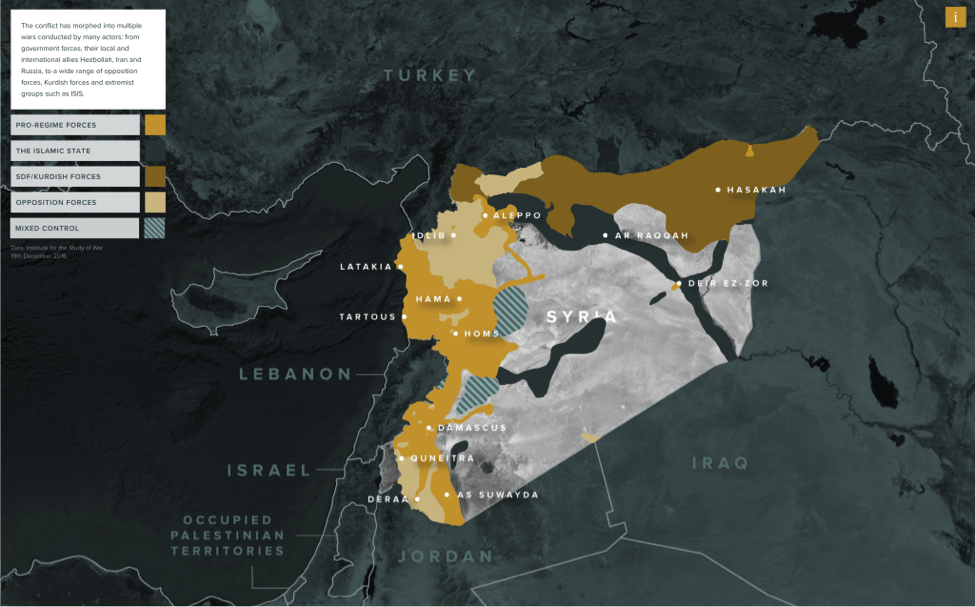
While the web of jihadists’ allegiance is ever-shifting, HTS’s dominance in the province had represented a strategic victory for al-Qaeda affiliated forces, as the regime and its international partners had focused their efforts on dislodging the more brazen and disruptive Islamic State’s forces. Yet, with ISIS increasingly on the defensive, Idlib province’s autonomy became less tenable. Further complicating the situation, the opposition’s territorial losses and the regime’s disregard for civilians’ safety have driven over 1.1 million internally displaced Syrians to take refuge in northern Syria since the conflict began, according to UN estimates.
The ferocity of the campaign coupled with the sheer number of people seeking refuge in the region has led to a uniquely dangerous situation for civilians.
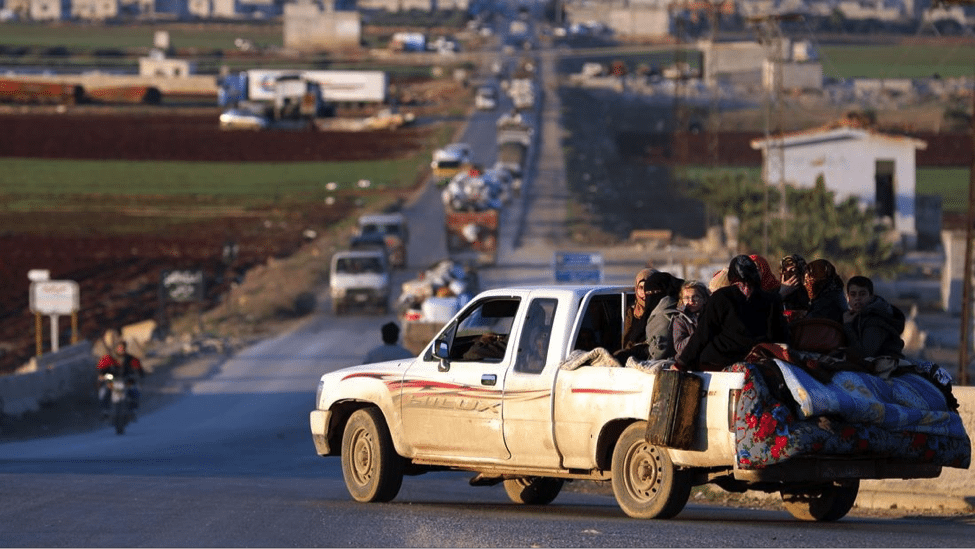
UN Human Rights Chief, Zeid Ra’ad Al Hussein warned that the safety of hundreds of thousands of civilians was in jeopardy. This point was highlighted by the Syrian Observatory for Human Rights, a UK-based human rights advocacy group, which reported on Assad’s forces’ seemingly indiscriminate bombing and shelling in the area surrounding the Abu al-Duhur airbase.
Further underscoring the danger, UN Deputy Spokesman Farhan Haq condemned the regime’s apparent systematic targeting of hospitals and medical facilities. In a statement to the press, Haq called for an “end the destruction of hospitals and other civilian infrastructure that is essential for the civilian population, and to respect their obligations under international humanitarian law and international human rights law.” The UN Office for the Coordination of Humanitarian Affairs has also voiced specific concerns via Twitter.
For the third time in less than a week, the Maternity and Pediatric Hospital in Ma’arrat An Nu’man #Idleb had been damaged and taken out-of-service. Such actions are utterly unacceptable and must stop #Syria
— OCHA Syria (@OCHA_Syria) January 6, 2018
While the UN has brought attention to humanitarian concerns, Turkey, one of the opposition groups’ primary backers, has sought to address the geopolitical implications of the campaign with the regional parties involved in the conflict. Idlib had been designated one of four ‘de-escalation zones’ after ceasefire negotiations were held in Astana, Kazakhstan during September 2017. On January 9, 2018, Turkey summoned the ambassadors of Russia and Iran, as guarantors of the Astana Peace Process, to Ankara to express its outrage over the Assad regime’s violations. The following day, Turkish Foreign Minister, Mevlüt Çavuşoğlu, reiterated that with the support of the three guarantors, Turkey, Russia and Iran, the ceasefire initiative had reduced violence in Syria and “paved the way for the resumption of the Geneva rounds after a 10-month-long hiatus.”
The interested parties had hoped that the ceasefire agreement and the implementation of the de-escalation zones could set the stage for a larger political compromise, culminating in the planned Syrian ‘Congress of National Dialogue’ to be held on January 29 – 30 in Sochi, Russia. Yet, as the regime’s campaign in Idlib province continues to devastate the civilian population, and opposition groups alike, the chances of a negotiated settlement bringing an end to the conflict appear less likely.
LIMA CHARLIE NEWS, with Sean McNicholas
Lima Charlie provides global news, insight & analysis by military veterans and service members Worldwide.
For up-to-date news, please follow us on twitter at @LimaCharlieNews

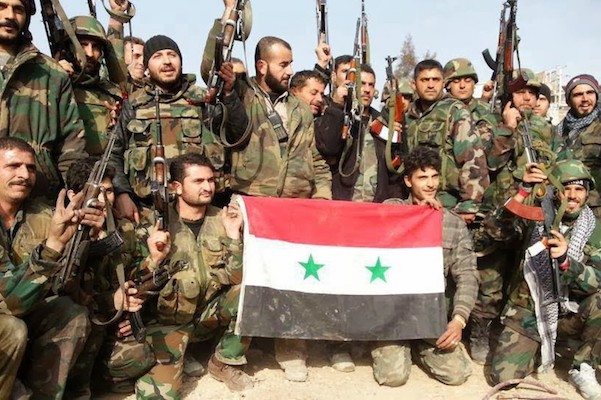
![Syria’s oil, gas and water - the Immiscible Solution to the War in Syria [Lima Charlie News][Photo: ANDREE KAISER / MCT]](https://limacharlienews.com/wp-content/uploads/2019/05/Syria’s-oil-gas-and-water-480x384.png)
![STRATEGIC OPTION | Syrian Endgame - The Hard Truth [Lima Charlie News][Photo: Bulent Kilic]](https://limacharlienews.com/wp-content/uploads/2019/05/STRATEGIC-OPTION-Syrian-Endgame-e1558501175322-480x384.png)
](https://limacharlienews.com/wp-content/uploads/2018/09/Hezbollah-Vehicles-Weapon-Transport-480x384.jpg)
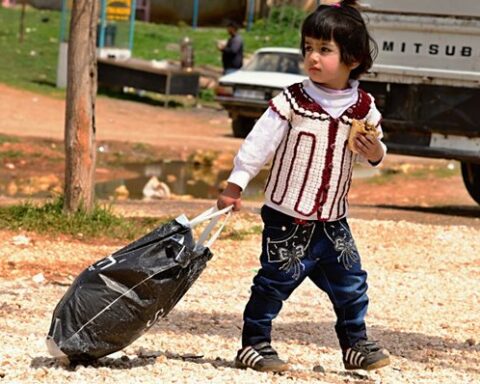

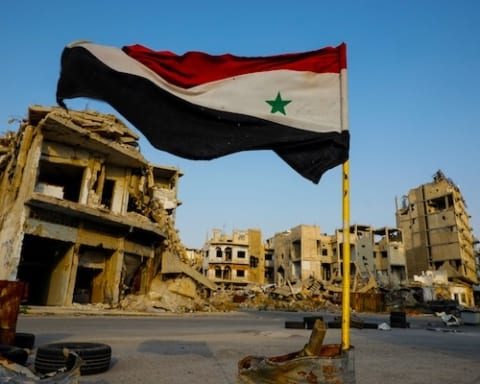
![The Art of Foreign Influence: The Russian Military Adviser [Lima Charlie News]](https://limacharlienews.com/wp-content/uploads/2019/06/The-Art-of-Foreign-Influence-The-Russian-Military-Adviser-480x384.png)
![Iranian crackdown on MEK shows the activist group has popular support [Lima Charlie News]](https://limacharlienews.com/wp-content/uploads/2019/05/Iran-MEK-Lima-Charlie-001-480x384.png)
![Syria’s oil, gas and water - the Immiscible Solution to the War in Syria [Lima Charlie News][Photo: ANDREE KAISER / MCT]](https://limacharlienews.com/wp-content/uploads/2019/05/Syria’s-oil-gas-and-water-150x100.png)
![STRATEGIC OPTION | Syrian Endgame - The Hard Truth [Lima Charlie News][Photo: Bulent Kilic]](https://limacharlienews.com/wp-content/uploads/2019/05/STRATEGIC-OPTION-Syrian-Endgame-e1558501175322-150x100.png)